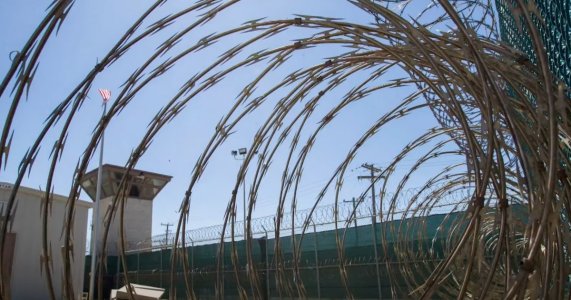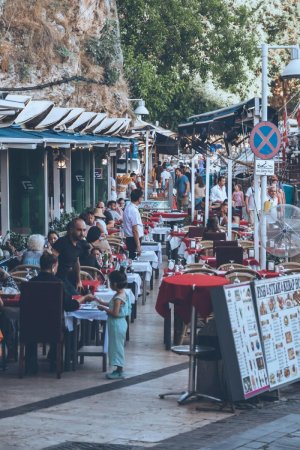Trump’s proposal to use Guantanamo Bay for "criminal aliens": What it means for the future
By
Veronica E.
- Replies 2
Guantanamo Bay, a name that has long been at the center of significant historical and legal discussions, is once again in the spotlight.
However, this time it’s not due to its past controversies, but rather a new proposal put forward by President Donald Trump that has sparked a range of reactions from both supporters and critics.
The plan to utilize the Guantanamo Bay facility to detain what the administration refers to as “criminal aliens” has brought forward many questions about its potential impact on US immigration policy, national security, and the future direction of detention practices.
With diverse opinions on the matter, this topic calls for careful and respectful consideration, as it touches on complex aspects of law, ethics, and national identity.

The Past and Present of Guantanamo Bay
Guantanamo Bay, often referred to as "Gitmo," has played a prominent role in US military operations for over a century. Though it is most widely recognized for its use as a detention facility following the September 11, 2001, attacks, many may not be familiar with its Migrant Operations Center.
This smaller section of the base has historically held migrants intercepted while attempting to enter the US by sea, particularly from regions such as Haiti and Cuba.
With the Trump administration's proposal to expand this center to accommodate a larger number of detainees, there are logistical and ethical considerations that need to be examined carefully.
Who Will Be Detained at Guantanamo?
The Trump administration has characterized the individuals who may be detained at Guantanamo Bay as those who present a significant risk to national security and public safety.
While the specifics of who will be detained remain somewhat unclear, the plan envisions housing individuals who are in the US illegally and have been involved in serious criminal activities, especially those who are difficult to deport.
While concerns surrounding illegal immigration and crime are central to the administration's approach, it's important to note that numerous studies have not found a direct correlation between immigration and higher rates of violent crime.
Legal and Ethical Considerations
Expanding Guantanamo Bay to hold more detainees brings forth important legal and ethical questions. Many organizations have raised concerns due to the facility’s controversial past, particularly regarding its association with indefinite detention.
The idea of housing more individuals, especially those facing immigration-related charges, has ignited debates on human rights and due process.
This discussion prompts us to think critically about how we balance national security with the core values of fairness, dignity, and justice that the United States stands for.
Cuba’s Position on Guantanamo Bay
It’s crucial to remember that Guantanamo Bay is leased from Cuba, and the Cuban government has long opposed this arrangement.
Cuban officials have criticized the continued U.S. use of the base, citing concerns about sovereignty and human rights.
This adds further complexity to the ongoing debate, especially as international attention remains focused on the U.S. policies surrounding immigration.
This is a topic that elicits a wide range of opinions, and while it may divide people, it’s important to approach the discussion with an open mind and a spirit of respectful dialogue.
Whether you support or oppose the proposal, we all share the responsibility to consider the broader implications of such decisions.
It’s essential to reflect on the values that shape our society and how these decisions reflect on the US, both domestically and on the world stage.

We invite you to share your thoughts and perspectives on this critical issue. What are your views on expanding Guantanamo Bay as a detention center? Do you believe this is the right approach, or are there other alternatives to explore? We look forward to hearing from you in the comments below—let’s engage in a thoughtful conversation!
Also read: Trump administration’s bold move for government workers—will you accept?
However, this time it’s not due to its past controversies, but rather a new proposal put forward by President Donald Trump that has sparked a range of reactions from both supporters and critics.
The plan to utilize the Guantanamo Bay facility to detain what the administration refers to as “criminal aliens” has brought forward many questions about its potential impact on US immigration policy, national security, and the future direction of detention practices.
With diverse opinions on the matter, this topic calls for careful and respectful consideration, as it touches on complex aspects of law, ethics, and national identity.

Guantanamo Bay: A site of historical significance and a new chapter in US detention policies. Image Source: YouTube / WGN News.
The Past and Present of Guantanamo Bay
Guantanamo Bay, often referred to as "Gitmo," has played a prominent role in US military operations for over a century. Though it is most widely recognized for its use as a detention facility following the September 11, 2001, attacks, many may not be familiar with its Migrant Operations Center.
This smaller section of the base has historically held migrants intercepted while attempting to enter the US by sea, particularly from regions such as Haiti and Cuba.
With the Trump administration's proposal to expand this center to accommodate a larger number of detainees, there are logistical and ethical considerations that need to be examined carefully.
Who Will Be Detained at Guantanamo?
The Trump administration has characterized the individuals who may be detained at Guantanamo Bay as those who present a significant risk to national security and public safety.
While the specifics of who will be detained remain somewhat unclear, the plan envisions housing individuals who are in the US illegally and have been involved in serious criminal activities, especially those who are difficult to deport.
While concerns surrounding illegal immigration and crime are central to the administration's approach, it's important to note that numerous studies have not found a direct correlation between immigration and higher rates of violent crime.
Legal and Ethical Considerations
Expanding Guantanamo Bay to hold more detainees brings forth important legal and ethical questions. Many organizations have raised concerns due to the facility’s controversial past, particularly regarding its association with indefinite detention.
The idea of housing more individuals, especially those facing immigration-related charges, has ignited debates on human rights and due process.
This discussion prompts us to think critically about how we balance national security with the core values of fairness, dignity, and justice that the United States stands for.
Cuba’s Position on Guantanamo Bay
It’s crucial to remember that Guantanamo Bay is leased from Cuba, and the Cuban government has long opposed this arrangement.
Cuban officials have criticized the continued U.S. use of the base, citing concerns about sovereignty and human rights.
This adds further complexity to the ongoing debate, especially as international attention remains focused on the U.S. policies surrounding immigration.
This is a topic that elicits a wide range of opinions, and while it may divide people, it’s important to approach the discussion with an open mind and a spirit of respectful dialogue.
Whether you support or oppose the proposal, we all share the responsibility to consider the broader implications of such decisions.
It’s essential to reflect on the values that shape our society and how these decisions reflect on the US, both domestically and on the world stage.
Key Takeaways
- President Donald Trump announced plans to use a detention center at Guantanamo Bay to hold tens of thousands of what he referred to as "the worst criminal aliens."
- US Immigration and Customs Enforcement would run the expanded facilities, although details of the plan were not immediately clear.
- The expansion is intended to provide additional space for high-priority criminal aliens unlawfully present in the United States.
- Criticism has arisen concerning the decision, including human rights concerns and opposition from Cuban officials, as Guantanamo is located in territory that Cuba claims is illegally occupied by the US.
We invite you to share your thoughts and perspectives on this critical issue. What are your views on expanding Guantanamo Bay as a detention center? Do you believe this is the right approach, or are there other alternatives to explore? We look forward to hearing from you in the comments below—let’s engage in a thoughtful conversation!
Also read: Trump administration’s bold move for government workers—will you accept?






